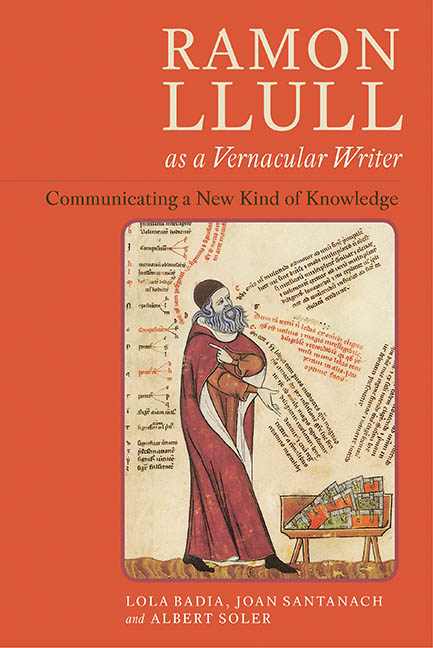Book contents
- Frontmatter
- Dedication
- Contents
- Illustrations
- Acknowledgements
- Abbreviations
- Introduction
- 1 Ramon Llull's Art, Language, and Literary Expression
- 2 Style and Genre in the Writings of Ramon Llull
- 3 The Composition and Dissemination of Ramon Llull's Texts, from Script to Print
- 4 Ramon Llull's Vernacular Context
- Epilogue. Ramon Llull's OEuvre as a Whole: Autobiographism and Self-Referentiality
- Appendix 1 First-Generation Llullian Manuscripts
- Appendix 2 Catalan Language and Literature in Relation to Ramon Llull
- Bibliography
- Index
Appendix 2 - Catalan Language and Literature in Relation to Ramon Llull
Published online by Cambridge University Press: 05 June 2016
- Frontmatter
- Dedication
- Contents
- Illustrations
- Acknowledgements
- Abbreviations
- Introduction
- 1 Ramon Llull's Art, Language, and Literary Expression
- 2 Style and Genre in the Writings of Ramon Llull
- 3 The Composition and Dissemination of Ramon Llull's Texts, from Script to Print
- 4 Ramon Llull's Vernacular Context
- Epilogue. Ramon Llull's OEuvre as a Whole: Autobiographism and Self-Referentiality
- Appendix 1 First-Generation Llullian Manuscripts
- Appendix 2 Catalan Language and Literature in Relation to Ramon Llull
- Bibliography
- Index
Summary
A comprehensive presentation of the Catalan reception of Ramon Llull's oeuvre would provide enough material for an entire book, one which would have to bring together information concerning four different areas: the role of Llull's vernacular writings in the history of the Catalan language; the influence of his works on early and contemporary literature; doctrinal and philosophical Llullism and anti-Llullism from their origins up to the twenty-first century; and, finally, historical and philological studies on Llull from the eighteenth century onwards. At this point, however, we need only set out some of the questions pertaining to the inclusion of Ramon Llull within the overarching history of the Catalan language and its literature during the earliest stages, and to refer the reader to Chapter 3, pp. 214–25, for information regarding Llullian philology, both Latin and Romance.
In Catalonia, literature in verse was written using a form of Occitan which became increasingly mixed with Catalan grammatical and lexical solutions from the twelfth century until the first quarter of the fifteenth. The choice of language used was linked to the genre employed, as Ramon Vidal de Besalú (Raimon Vidal de Bezaudun) explains in his Razos de trobar, written around the turn of the thirteenth century: ‘The French language is better at and more suited to producing romances and pastorelas, although Limousin is better at producing poems and cansos and sirventes.’
The term ‘Limousin’ designates the Occitan used by the troubadours. Prose, which Ramon Vidal fails to mention, made its first appearance in Catalan within works having a historical focus of immediate political import and reached a significant level of maturity from the last third of the thirteenth century onwards. The earliest witness is the Llibre del rei En Pere [Book of King Peter] by Bernat Desclot, datable to between 1280 and 1288, together with the Llibre dels fets [Book of Deeds] by James I the Conqueror, mentioned above in Chapter 4 (pp. 245–7). On account of the early date attaching to their composition – the Book of Contemplation dates from 1273 to 1274 – the works of Ramon Llull in the vernacular tongue form part of the opening chapters in the history of the Catalan language and its literature, alongside the troubadours and the earliest chronicles.
- Type
- Chapter
- Information
- Ramon Llull as a Vernacular WriterCommunicating a New Kind of Knowledge, pp. 327 - 334Publisher: Boydell & BrewerPrint publication year: 2016



